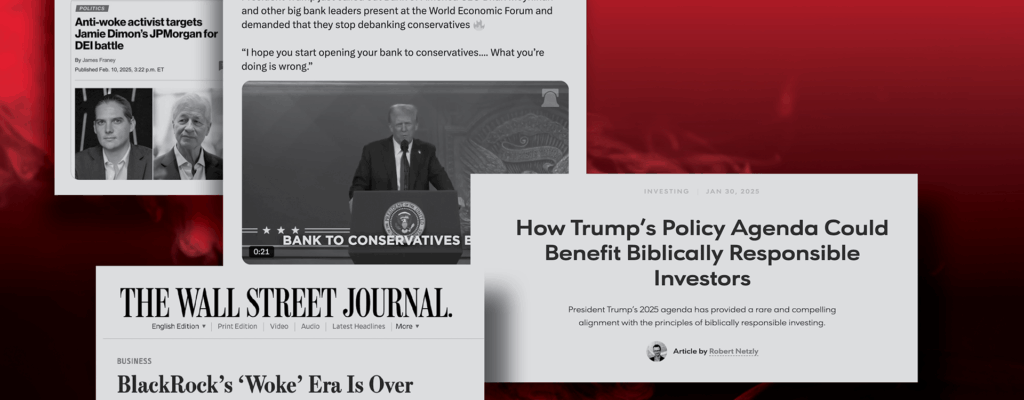Emily McCormick is Vice President of Editorial & Research for Bank Director. Emily oversees research projects, from in-depth reports to Bank Director’s annual surveys on M&A, risk, compensation, governance and technology. She also manages content for the Bank Services Program, including Bank Director’s Online Training Series. In addition to speaking and moderating discussions at Bank Director’s in-person and virtual events, Emily writes and edits for Bank Director magazine, BankDirector.com and Bank Director’s weekly newsletter, The Slant. She started her career in the circulation department at the Knoxville News-Sentinel and graduated summa cum laude from The University of Tennessee with a bachelor’s degree in Spanish and International Business.

Banks Rethink DEI, ESG in the Face of Conservative Pressure
Pressures from conservative investors and politicians have forced financial firms to revise their approach to corporate responsibility.
*This article appeared in the Q4 2025 issue of Bank Director magazine. You can subscribe here.
When Robert Netzly formed Inspire Investing in 2015, he wanted to offer a “biblically responsible” investing option for clients.
“Biblically responsible investing means applying scripture directly to what we do or don’t buy,” he says. “If we are stewards of God’s money according to our biblical beliefs, then what are we putting God’s money into? Are we investing into abortion drug companies and strip clubs, or are we putting it to cure cancer and make people’s lives better?” Today, Netzly’s firm manages over $3 billion in assets for investors through its faith-based ETFs and 40 wealth management offices. But he isn’t just seeking out investments that align with his values. His firm is actively engaging with companies — particularly banks — to shift their practices and policies.
Just a few years ago, banks were pressured to support left-leaning causes. Big banks were touting promises to reduce greenhouse gas emissions. They made financial commitments to diversity, equity and inclusion (DEI) programs following the murder of George Floyd by a Minneapolis police officer in 2020. Banks also started sharing their progress in dedicated ESG reports. ESG is an umbrella term that references environmental, social and governance practices, including corporate governance, ethics, community engagement, environmental sustainability and DEI — a controversial acronym in conservative circles. Experts in the space say public companies — and banks in particular — have matured their ESG reporting to better reflect issues that are material to the business. But conservative investors like Inspire, along with right-wing politicians, forced a sea change in how banks approach ESG. These groups believe corporate America has pushed too far to the left — and they’re applying intense pressure to move the needle toward the right. Can banks balance that with their own mission and values in this changing landscape?
A Pendulum Swing Right
The DEI and ESG blowback hasn’t been limited to conservative investors. It’s also been the focus of a wave of executive orders. Shortly following his inauguration, President Donald Trump signed three orders targeting federal DEI programs, encouraging the private sector to end “discriminatory” DEI practices and limiting the federal government’s definition of gender to male and female. Hiring or implementing quotas based on characteristics such as race or gender already ran afoul of federal law. It’s still legal to actively recruit from universities, publications or other groups that target certain demographics, such as historically Black colleges. Employee resource groups should be open to all employees and prioritize professional development over advocacy, according to a note from the employment law firm Kastner Westman & Wilkins.
An array of executive orders also have targeted climate change, rescinding earlier orders from President Joe Biden and instructing the attorney general to identify state laws that “overreach” in addressing climate change, greenhouse gas emissions or ESG.
The new administration has also proved sensitive to claims of debanking based on right-leaning political or religious beliefs. At the World Economic Forum in Davos, Switzerland, earlier this year, Trump told Bank of America Corp. CEO and Chairman Brian Moynihan: “I hope you start opening your bank to conservatives, because many conservatives complain that the banks are not allowing them to do business within the bank.” On Aug. 7, Trump signed an executive order that directed federal regulators to remove supervisory guidance that enables debanking and to identify financial institutions with past or current policies that require or encourage “politicized or unlawful debanking” and take appropriate remedial action.
Claims of debanking led Inspire to engage with large banks and asset managers. “That’s where the cancel culture was happening,” Netzly says. “People should have access to banking services regardless of their ideology.” Those engagements can range from conversations with executives to formal shareholder resolutions, he adds. Between 2022 and 2025, Inspire engaged with 12 banks and one core provider over alleged debanking; in July, Inspire published a list of debanking claims that included Trump and his family.
Netzly says the firm engaged with JPMorgan Chase & Co. to clarify its policies around hate speech, which he claims led to closures of accounts based on religious grounds. “They ended up making some substantive changes,” says Netzly. In a statement, a JPMorgan Chase spokesperson told Bank Director: “We do not close accounts as a result of someone’s political affiliation or religious beliefs. The amendment to language in our Code of Conduct is consistent with prior public statements.”
Banks can close an account for a variety of reasons, including a negative balance, inactivity or suspicious activity, and they often don’t disclose why, citing federal law. Evidence of politically motivated debanking appears to be anecdotal.
Inspire has also targeted DEI practices, including identity-focused employee resource groups, which tend to be voluntary and employee-led. Netzly says the firm is particularly concerned about corporate practices that force Christians to “celebrate” LGBTQ values.
According to a June 26 announcement from Inspire, $89 billion Zions Bancorp. in Salt Lake City removed all references to DEI and employee resource groups from public-facing materials following discussions with Inspire; Zions also confirmed that DEI doesn’t factor into hiring decisions. The company doesn’t require diversity training and doesn’t provide gender transitioning benefits to minors, said Inspire. Zions did not respond to Bank Director’s request for comment.
States Target ESG
Inspire’s efforts could be bolstered by activity from state legislatures. Since 2021, at least 482 anti-ESG bills and resolutions have been proposed in statehouses across the country, according to Pleiades Strategy, a climate and clean energy research and advisory firm. These laws seek to ban ESG scoring or otherwise end ESG as an investment consideration for pension funds; some bills target proxy advisory firms. Others seek to end perceived discrimination against specific industries such as oil and gas. As of July 30, 54 of those bills had become law in 22 states.
Promulgated by conservative politicians, these laws have had a chilling effect that’s harmful for investors and communities, says Connor Gibson, senior adviser to Pleiades Strategy. They also generate more bureaucracy and increase the regulatory hurdles facing companies, he says.
A law passed in Texas would require proxy advisory firms to disclose when their advice isn’t based solely on financial considerations; that law would apply to public companies domiciled in Texas. It was expected to take effect on Sept. 1, ahead of the 2026 proxy season, but an order from a federal district court will prevent enforcement of the law, at least temporarily.
Bills that target alleged debanking by large institutions and impose civil liabilities have also gained traction. A Tennessee law that took effect in July 2024, for example, prohibits financial institutions above $100 billion in assets from denying services based on political or religious beliefs, specifically noting gun ownership, agriculture, participation in extractive industries such as mining, and the support of government efforts to curb illegal immigration. Noncompliance could result in fines or other penalties under the Tennessee Consumer Protection Act, according to the Tennessee Bankers Association.
Banks “should have the right to say, ‘No,’ based on a risk analysis,” says Gibson. “This isn’t about feelings. This is about material risks when you force a financial institution — whether it’s an asset manager or a bank, an insurance company — to ignore these types of risks.”
Some states are moving in the other direction. Companies with annual revenues in excess of $500 million that do business in California will be required to disclose climate-related financial risks facing the business, how they could impact strategy and the measures that have been taken to mitigate those. They will also have to disclose their greenhouse gas emissions. Colorado, New Jersey, New York and Illinois could pass similar laws.
“If we’re thinking about regulatory requirements for financial institutions, it’s ultimately coming down to these state-level regulations,” says Daniela Arias, who leads ESG services at Crowe.
Adjusting Approaches to ESG
Pressure at the federal level from the White House, anti-ESG legislation from the states and activism from conservative groups may have curbed ESG reporting nationwide. In an analysis of Russell 3000 companies, The Conference Board found that the number of sustainability reports fell 52% year over year. The nonprofit research organization also reported that 80% of ESG professionals at large U.S. and multinational companies have shifted ESG strategies. In a separate examination of S&P 500 companies, The Conference Board found references to “diversity,” “gender,” “racial” and “DEI” in SEC filings had fallen from the first half of 2024 to the first half of 2025. Companies are adjusting language and terminology; they’re more aware of reputational and legal risks. They’re aligning reporting and initiatives with strategy and financial returns.
Banks should revisit their ESG goals to ensure they’re measurable and material to the business, says Andrew Jones, principal researcher at The Conference Board. For example, he says companies have adjusted race- and gender-specific development and networking programs to avoid legal challenges; these would include mentorship and recruitment based on race or gender, quotas, supplier diversity goals and initiatives, and financially supporting nonprofits focused on racial or gender equality. Some companies have cut references to DEI programs from reports while continuing those initiatives internally.
After engaging with Inspire, Pasadena, California-based East West Bancorp, with $78 billion in assets, removed references to DEI from its corporate responsibility report and other public materials. In a statement, an East West spokesperson said the bank’s leadership “regularly engages with a range of stakeholders — including customers, community members, shareholders and employees — to discuss our corporate responsibility efforts. We remain firmly committed to listening to their concerns.”
“I definitely don’t envy the role of the sustainability and DEI head at this time,” says Jones. “You want to meet those big aspirational goals you probably set a few years ago. At the same time, you’ve got big questions coming internally — including from the board, from the C-suite, from the lawyers — that are very tricky. You’ve got pressure outside the firm from all kinds of activists, all kinds of loud voices, all kinds of noise.”
But those commitments often have a business purpose. “Companies were committed to DEI because they want their employee base to represent the communities in which they work,” he says. “They want to have that diversity of thought and creativity and entrepreneurialism that comes with a diverse workplace and want to position themselves for a future in which the population is diversifying demographically. That imperative remains.”
Of the 35 publicly traded banks exceeding $50 billion in assets at the end of last year, 18 published a 2024 ESG report as of Aug. 1, according to a Bank Director analysis. Another eight banks confirmed their plans to publish reports later in the year. But most don’t call it ESG; corporate responsibility and sustainability are now the most common terms used for these reports.
“ESG became a politicized acronym,” says Jones at The Conference Board. “When you talk about long-term sustainability, you talk about the sustainability of a company,” he says. “It communicates, at least to some audiences, an alignment with the business.”
SouthState Bank Corp., a $65.9 billion institution based in Winter Haven, Florida, published its corporate stewardship report in April, a change in name from its corporate social responsibility report in 2022, 2023 and 2024. LeDon Jones, a long-time employee of the company named SouthState’s director of corporate stewardship in 2020, says the target audience for that report includes shareholders, the community and employees. But it’s clear in talking to him that the bank’s team members are at the heart of that reporting. “We’re only as good as our team members are,” he says, “so we invest a lot of time and resources in our team members.” That means career and leadership development programs, as well as a program called SouthState Connects that focuses on networking and mentoring for women and veterans. “It’s open to everybody,” Jones explains.
He says the bank’s commitment to diversity hasn’t changed. “[It’s] business as usual for us,” he says. “Under that corporate stewardship umbrella, [we are] creating opportunities for everyone, creating a sense of belonging for everyone. Nothing more, nothing less.” Bank Director’s 2025 Compensation & Talent Survey found significantly fewer saying their banks tracked gender, racial and ethnic representation compared to 2024, but that doesn’t seem to be the case at SouthState. While there are fewer mentions of diversity in this year’s report, the bank discloses metrics that detail gender, racial and ethnic, and generational diversity through the corporation, including for commercial banking interns and associates.
Emphasizing Risk, Governance
Marija Kramer, head of corporate solutions at ISS-Corporate, says there’s still significant demand from investors for more transparency into risks. They want to know a company has assessed its cybersecurity risk and whether business continuity plans are comprehensive, and how the board is overseeing risks. In today’s politicized environment, that might not be viewed as ESG, but it is, she says. The “G” stands for governance, after all.
Tupelo, Mississippi-based Cadence Bank, with $50.4 billion in assets, published its 2024 corporate engagement and governance report earlier this year, renamed from its environmental, social and governance report in prior years. Broadly, the recent report focuses on community investment, talent and the environment — energy efficiency, carbon emissions and opportunities in renewable energy financing. Corporate governance also features prominently, including director expertise and how the bank responded to shareholder feedback to declassify the board. Information about the bank’s approach to ethics, compliance and risk management — including information security, data privacy and third-party risk — are also detailed.
“We’ve gotten a lot of positive feedback from investors and stakeholders around that report,” says Tyler Lambert, chief risk officer at Cadence. Almost half of the bank’s shares are held by institutional investors, including The Vanguard Group and BlackRock.
Both Vanguard and BlackRock take a case-by-case approach in proxy voting and engagement, according to their voting guidelines for 2025, and emphasize board composition and effectiveness, risk oversight, shareholder rights and linking executive pay with long-term results. Both indicate boardroom diversity can add value. “Over the past decade, we observe companies increasingly nominating directors from different backgrounds,” said BlackRock’s guidelines, “noting that this helps their boards more effectively understand the company’s customers, employees, and communities.” Vanguard noted that, “Diversity of thought, background, and experience, as well as personal characteristics (such as age, gender, and/or race/ethnicity), meaningfully contribute to the ability of boards to serve as effective, engaged stewards of shareholders’ interests.” But both stop short of advocating for a specific quota for diversity.
Inspire, meanwhile, developed its own scoring to rate how companies align with its preferred values. Netzly says the framework put a faith-based spin on the SASB standards, which were developed to create a common language for connecting ESG issues to a company’s long-term performance. Companies earning a negative score from Inspire are excluded from its investment portfolio, and some factors result in an automatic exclusion, such as employee travel benefits to get an abortion, tobacco or cannabis production and distribution, or marketing and philanthropy that support LGBTQ advocacy. Eighty-five percent of public companies pass Inspire’s screening, Netzly says. Factors earning a positive rating include business resilience, data security, employee welfare, low ecological impact, risk management and regulatory adherence.
“We’re not the moral police. People are free to draw their own conclusions,” says Netzly. “But we do think they should be educated about what’s going on in the portfolio.” That’s long been the goal of ESG advocates, as well — providing investors with more clarity into business practices and long-term risks.
Another critical player in the anti-ESG push has been The Heritage Foundation, the conservative think tank that authored Project 2025. That document outlined how the group sought to reshape the U.S. government following Trump’s reelection last year. ESG is mentioned 40 times in the 920-page report; DEI and diversity are mentioned 92 times. Some of the legislation hitting statehouses has come from the group. Heritage leverages its own investment portfolio, fueled by over 500,000 donors, to pressure companies. Anti-ESG advocate Robby Starbuck, a conservative personality who has made headlines by pressuring companies such as Tractor Supply Co. and JPMorgan Chase, joined the organization earlier this year as a visiting fellow for its capital markets initiative.
“ESG is a material risk for any company,” says Andrew Olivastro, chief advancement officer at The Heritage Foundation. “A company that embraces ideology and politics, and not performance, is going to hemorrhage talent, trust and market leadership.”
Heritage filed four shareholder resolutions against U.S. public companies during the 2025 proxy season. One proposal against International Business Machines (IBM), which was withdrawn, focused on the company’s DEI initiatives. One against Citigroup focused on allegations that the bank surveilled conservatives following the Jan. 6, 2021, attack on the U.S. Capitol; another against Airbnb was tied to the removal of listings in Israel. A fourth, against CVS Health Corp., objected to its sale of mifepristone, an abortifacient. The Citi, Airbnb and CVS proposals were excluded from those companies’ proxy statements, meaning shareholders couldn’t vote on them.
“The political and ideological left has tried to take over capital markets and the private sector,” says Olivastro. “We’re pushing back directly on that.” He says he wants corporations to focus on maximizing returns for shareholders.
Boards and executives do, of course, have an obligation to act in the best long-term interests of shareholders. But many argue that a diverse workforce benefits a company, and climate change represents a real financial risk.
And pulling back on ESG efforts can carry its own risks. In June 2024, Tractor Supply announced a shift in its strategy following pressure by Starbuck. The company refocused on “rural America priorities,” renounced its carbon emission goals and eliminated DEI efforts, including sponsoring LGBTQ pride events.
That didn’t sit well with some employees and customers. The National Black Farmers Association called for Tractor Supply CEO Hal Lawton to step down, according to news reports. Some employees resigned. That said, Lawton is still there, and as of Sept. 3, Tractor Supply’s stock was up 16% year-over-year.
Placating one group of stakeholders can alienate another group, says Jones at The Conference Board, and raises questions about how authentic a company’s prior commitments were. He advises companies to have a clear view of their stakeholders — investors, employees, customers and communities — and what they value.
The conservative rabble-rousing has had its intended effects, especially with continued pressure from the White House and Republican states. And companies will adapt, but The Conference Board’s Jones doesn’t think banks will stop reporting on the wide array of issues found in ESG reports — whether that’s green initiatives, community outreach, culture or good old-fashioned governance.
“Many sustainability leaders are reading the room and reading the vibes, and are trying to articulate the business rationale for doing this work,” says Jones. Companies “don’t just do it because it’s the nice thing to do. … [They] do it because it has fundamental impact on the firm.”



